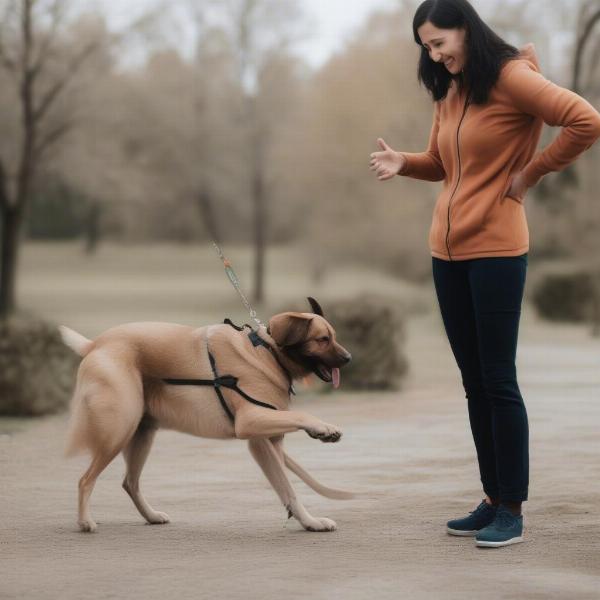Revolt for dogs, or canine resistance, can manifest in various ways, from ignoring commands to outright defiance. Understanding the root causes of this behavior is key to addressing it effectively. This article delves into the reasons behind canine resistance, providing practical solutions for a more harmonious relationship with your furry friend.
Why Do Dogs Revolt?
Canine resistance isn’t simply about being “stubborn.” It’s often a form of communication, signaling underlying issues that need attention. Several factors contribute to this behavior:
- Lack of Clear Communication: Dogs don’t speak our language. Inconsistent or unclear commands can lead to confusion and resistance. Using clear, concise cues, paired with consistent body language, is crucial.
- Insufficient Training: A dog without proper training might not understand what’s expected of them. Positive reinforcement methods, like rewarding desired behaviors, are more effective than punishment.
- Underlying Medical Issues: Pain or discomfort can cause a dog to resist commands. If your dog suddenly starts exhibiting resistance, a veterinary checkup is warranted.
- Fear or Anxiety: A fearful or anxious dog might resist commands as a coping mechanism. Identifying and addressing the source of their fear is essential.
- Breed-Specific Traits: Certain breeds are naturally more independent or headstrong. Understanding your dog’s breed characteristics can help tailor your training approach.
Addressing Canine Resistance: Practical Tips
Dealing with canine resistance requires patience, consistency, and a positive approach. Here are some effective strategies:
-
Establish Clear Communication: Use short, simple commands and consistent hand signals. Avoid confusing your dog with multiple cues for the same action.
-
Positive Reinforcement Training: Focus on rewarding desired behaviors with treats, praise, or toys. Avoid punishment, as it can escalate resistance and damage your bond with your dog.
-
Address Underlying Medical Conditions: If your dog’s resistance is sudden or accompanied by other behavioral changes, consult a veterinarian to rule out any medical issues.
-
Manage Fear and Anxiety: Create a safe and predictable environment for your dog. Desensitization and counter-conditioning techniques can help address specific fears.
-
Tailor Training to Breed: Understand your dog’s breed-specific traits and adjust your training accordingly. Some breeds may require more patience and specialized training methods.
-
Seek Professional Help: If you’re struggling to address your dog’s resistance, consult a certified professional dog trainer. They can provide personalized guidance and support.
Is My Dog’s Resistance a Sign of Dominance?
The concept of “dominance” in dog training is largely outdated. Canine behavior is complex and rarely about asserting dominance over humans. Resistance is more likely rooted in miscommunication, fear, or unmet needs.
 Dog Trainer Working with a Dog Using Positive Reinforcement
Dog Trainer Working with a Dog Using Positive Reinforcement
Conclusion: Building a Stronger Bond Through Understanding
Addressing revolt for dogs involves understanding their perspective. By focusing on clear communication, positive reinforcement, and addressing underlying issues, you can build a stronger, more harmonious relationship with your canine companion. Patience and consistency are key to overcoming resistance and fostering a deeper bond.
FAQ
- Why is my dog suddenly resisting commands? Sudden resistance could indicate a medical issue, fear, or a change in the environment. Consult a veterinarian or professional trainer.
- How do I deal with a resistant dog during walks? Use positive reinforcement, consistent leash training, and avoid pulling or jerking the leash.
- Is it okay to punish a resistant dog? Punishment can worsen resistance and damage your relationship with your dog. Focus on positive reinforcement instead.
- Can any dog breed be trained to overcome resistance? Yes, with patience and the right approach, any breed can learn to overcome resistance.
- When should I seek professional help for my dog’s resistance? If you’re struggling to make progress or your dog’s resistance is escalating, consult a certified dog trainer.
About ILM Dog: ILM Dog is your trusted source for comprehensive dog care information, offering expert advice on everything from breed selection and training to health and nutrition. We’re dedicated to helping you build a stronger bond with your canine companion. Need assistance with dog training or behavior? Contact us at [email protected] or call +44 20-3965-8624.